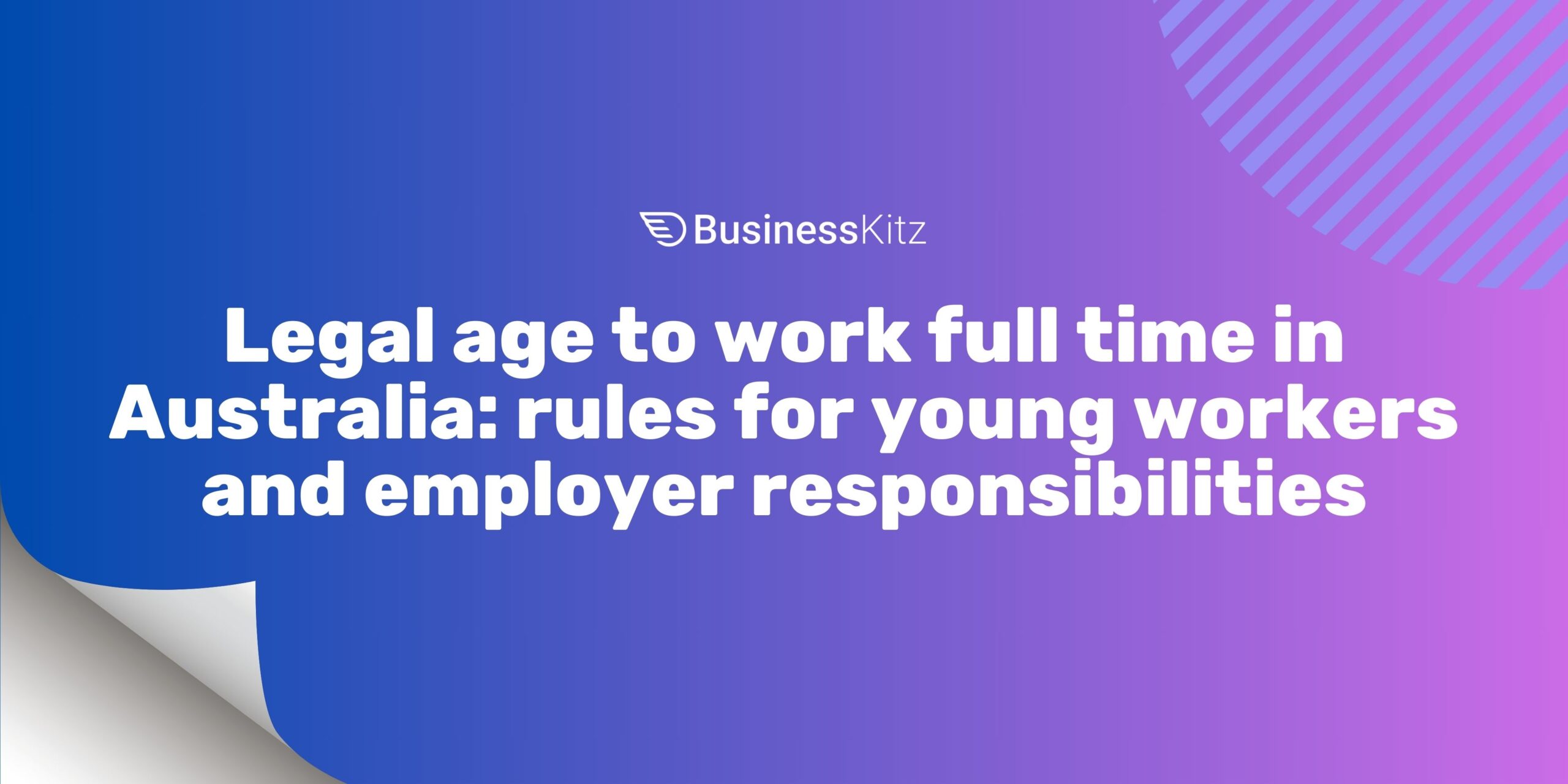
We've helped businesses save $55m with our all-in-one platform. Get instant access to this template and 115+ others, plus AI-powered document creation, starting completely free.
When hiring young workers, It is essential for employers to understand the legal age to work full time in their state or territory and comply with relevant employment legislation and Fair Work regulations. Some roles and industries have specific age requirements or require parent’s written permission before hiring young workers.[ez-toc]
The legal age to work full time in Australia varies by state and territory. Most young workers can start full-time jobs at 16 or 17 years old, but some may qualify earlier through apprenticeships or traineeships. Employers must follow Fair Work regulations, ensure safe conditions and meet child employment laws. This guide explains the rules and restrictions for employers hiring young people for full-time roles.
Full-time work means working a set number of hours each week. In Australia, this is usually 38 hours per week. Full-time workers get benefits like paid leave and job security. Young workers must meet certain conditions before taking on a full-time role. Business Kitz full-time contract template can help you get started.
Young workers can be part-time, casual or full-time employees. Each type has different conditions:
Business Kitz offers casual, part-time and full-time employment agreement templates via our Document Library.Sign up today!

Different age limits and specific restrictions may apply when hiring young workers in certain industries. Some jobs require workers to be a certain age for safety reasons.
The minimum age for employment in a full-time job differs across states and territories.State/TerritoryMinimum full-time working ageQueensland16 years old (or 15 years old with approval)New South Wales17 years old (or completed Year 10)Victoria17 years old (or 16 years old with conditions)Western Australia16 years old (or 15 years old for apprenticeships)South Australia17 years old (or 16 years old with conditions)Tasmania17 years old (or completed Year 10)Australian Capital Territory17 years old (or completed Year 10)Northern Territory17 years old (or completed Year 10)Minimum age requirements may vary if engaging a young worker for an apprenticeship or traineeship. Employers should always seek advice from a legal professional if unsure.
Australia has both federal and state laws that regulate the minimum working age. These laws protect young workers and set rules for employment. Employers must follow both national and state-based rules to stay compliant.
The Fair Work Act applies across Australia. It sets minimum wages, working hours and entitlements for all workers, including young employees. The Fair Work Ombudsman enforces these rules and provides guidance on workplace rights.Federal law does not set a minimum age for employment, but states and territories do. This means the minimum legal working age can vary depending on location and industry.
Each state or territory has its own child employment laws. These laws control:
Employers must check local child employment regulations to ensure compliance.
Young workers have rights under Fair Work laws. These include:
Some jobs require parent or guardian consent before a child can start work. This applies to roles in the entertainment industry, delivery work and other industries. In some states, an employer must get written permission before hiring a young worker.Employers must also:
Before hiring a young worker, businesses should check state laws and consult a workplace relations professional if needed.

Each state and territory in Australia sets its own minimum working age laws. These laws cover when a child can start full-time work, industry restrictions and employer responsibilities. The following breakdown is not an exhaustive list and employers should engage employment specialists to be sure of their hiring obligations.
Employers must follow Fair Work regulations and child employment laws in their area of work. Breaking these laws can lead to fines and penalties. Employers should check their local rules before hiring young workers for an apprenticeship or full-time job.
Work experience helps young people develop skills and prepare for full-time jobs. It gives them real-world knowledge and improves their chances of getting hired. Many students complete work experience while still in school. Others take part in programs like apprenticeships or traineeships to enter the workforce sooner.
Work experience allows young people to:
Work experience programs must follow child employment laws. Rules depend on the state or territory and the area of work. Key legal points include:
Common pathways to full-time work include:
A legal professional can help employers understand their obligations and the entitlements of young workers.

Employers must follow strict rules when hiring young workers. These rules cover workplace safety, fair pay and legal compliance. Breaking these laws can lead to penalties, fines and reputational damage.
Employers must provide a safe work environment that does not put young workers at risk. This includes:
Fair pay is also essential. Employers must pay at least the minimum wage based on the worker’s age and job type. Pay rates are set by Fair Work and vary depending on whether the worker is part-time, casual or full-time.
Employers must follow child employment laws set by their state or territory. Key legal points include:
Employers should check if their industry has restrictions on work during school hours or night shifts.
Employers must be aware of their legal duties. Business Kitz makes compliance easier with:
Employers should always check state laws and seek advice from a workplace relations professional if unsure.
The minimum age to work in Western Australia is 13 years for light work like shop assistant roles. Children working in a family business can start working at any age. Some jobs in umpire or modelling allow younger workers with approval.
Young workers in Queensland can start full-time jobs at 16 years old or age 15 if they have completed Year 10. The employment of children under this age is limited unless they are in an apprenticeship or traineeship.
In Tasmania, young workers can start full-time work at 17 years old or 16 years old if they have completed Year 10. Younger children can take on part-time jobs in some industries, such as retail or hospitality.
In New South Wales, the minimum age for full-time work is 17 years old. Children working in the entertainment industry can start earlier with approval. The minimum age may vary depending on the industry.
Young workers in the Australian Capital Territory cannot work during school hours unless they are in an approved apprenticeship or traineeship. They can start employment at 15 years old, but full-time work is only allowed after they have completed Year 12 or reach 17 years old.
No. While family businesses that employ their child to work may have fewer restrictions, most industries require young workers to meet a minimum age. In many cases, they must be 15 to work without restrictions.
For more details on legal working ages and compliance, contact an employment law legal professional or speak with Fair Work.
Employers must meet minimum legal working age rules before hiring young workers in full-time jobs. Each state and territory has different age requirements and restrictions on work during school hours. Employers should check wage rates under Fair Work to meet their entitlements or obligations, follow child employment laws and ensure safe work conditions. Understanding these laws helps protect businesses from fines.Business Kitz makes compliance simple. Our legally approved employment contracts and templates help businesses follow Fair Work rules. Sign up for a free account today!Disclaimer: This content is intended to be used for educational and informational purposes only. Business Kitz does not offer legal advice and cannot guarantee the accuracy, reliability, or suitability of its website content for a particular purpose. We encourage you to seek professional advice from a licensed professional and verify statements before relying on them. We are not responsible for any legal actions or decisions made based on the information provided on our website.Unless expressly stated otherwise, all content, materials, text, images, videos and other media on this website and its contents are the property of their respective copyright owners.
Copyright © 2025 Business Kitz 14312161